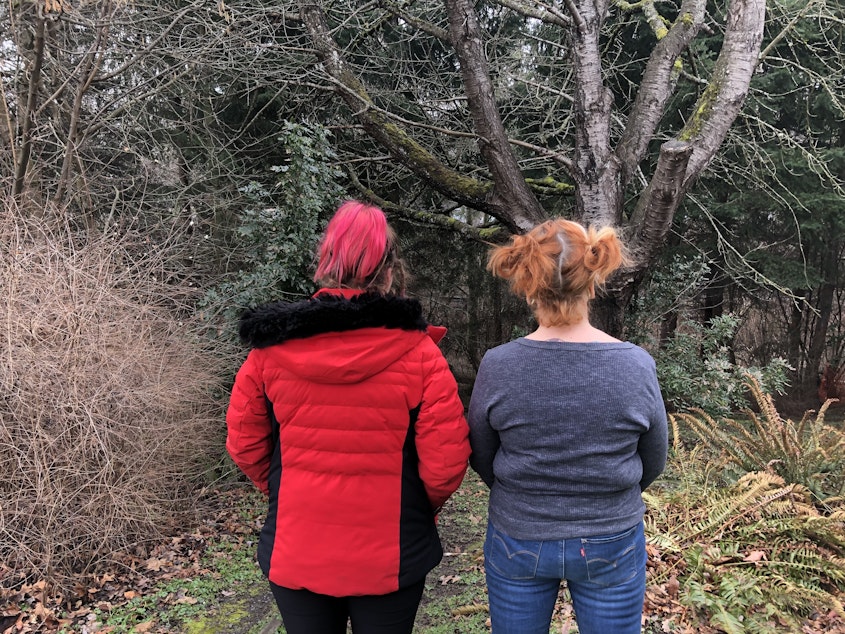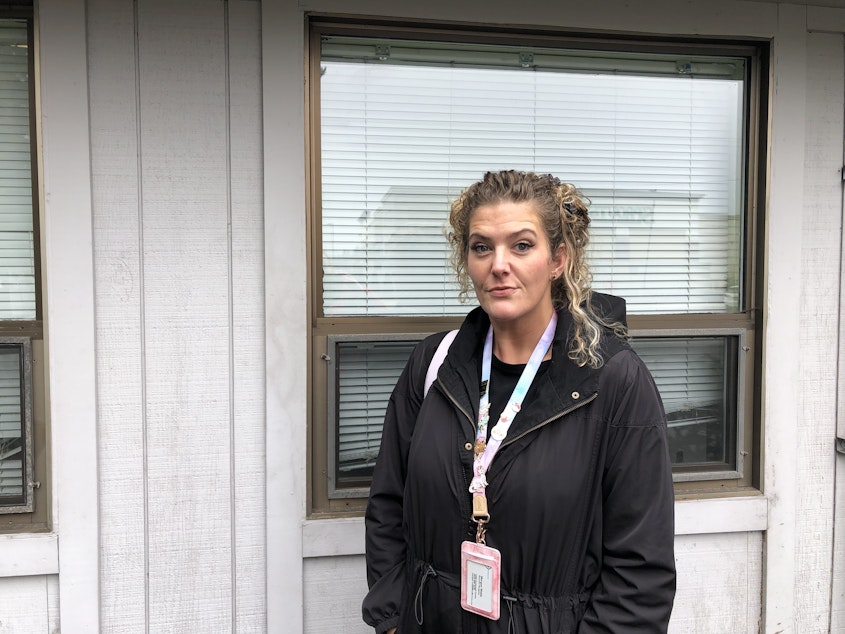Washington's next drug law could let accused choose treatment, services over jail time

Lawmakers in Olympia are currently mapping out a new strategy for people in Washington state caught using illicit drugs.
On Friday, the State Senate passed a bill that would boost criminal penalties for drug possession but allow people to avoid jail if they engage in treatment and services.
Advocates for reduced incarceration welcome the emphasis on diverting people from courts and jail. But they say the state must shore up its fledging system to help those recovering from substance abuse.
On a chilly weekday morning, Morgan Webb is visiting a boxy, grey building in Lynnwood, north of Seattle. The building has three big garage doors — it used to be an emissions testing center for cars. Now it’s a hygiene center offering showers, food, and clean clothes to anyone who shows up. It’s a place where Webb can make contact with the clients she’s trying to help — people whose needs she recognizes.
“I was unhoused myself for three years, I was addicted to heroin and methamphetamine for three years, and I cycled in and out of jail, in and out of jail,” she said.
Webb said five years ago that changed, when she noticed a social worker making rounds with local police.
“The first time that social worker came into the camp with police, I was confused, right — like, why are they not arresting me? What do you mean you want to help me?”
The social worker got her into treatment and transitional housing. Fast forward and Webb now works for the Law Enforcement Assisted Diversion program or “LEAD” to help people in Snohomish County facing the same struggles she once had. She also coordinates their cases with police, prosecutors, and public defenders.
Sponsored
“I have a caseload of about 20 folks who are in various stages of recovery, addiction, houselessness and I just sort of help guide them to the services that are going to help them,” she said.
Webb has been on the front lines as the state’s drug laws changed with astonishing speed.
In the 2021 case known as State v. Blake, the Washington Supreme Court struck down a law that made simple drug possession a felony. In response, legislators passed a stopgap bill (it expires this summer) that made drug possession a misdemeanor. That temporary law also requires police to refer people to services at least twice before arresting them.
When someone acts on that police referral, Webb is one of the “recovery navigators” who gets those calls.
“Snohomish County LEAD actually hosted the first recovery navigator in the state and that was me,” she said. “But now there are recovery navigators in every county.”
Sponsored

Webb noted that the arrival of fentanyl adds to the urgency and difficulty of her clients’ situations.
“When I was out here, it was heroin,” she said. For fentanyl users, Webb added, detox is harder, medication assisted treatment is less effective at reducing cravings, and overdoses are harder to reverse.
"It’s devastating," she said. "It’s just making it harder for people to enter recovery."
More jail and more diversion under SB 5536
Sponsored
With Senate Bill 5536, legislators are on track to increase criminal penalties for simple drug possession to a gross misdemeanor, with a maximum penalty of 364 days in jail. However, the bill states that both police and prosecutors are “encouraged to divert such cases for assessment, treatment, or other services.”
Supporters of the bill say stiffer penalties will act as leverage, incentivizing people to access drug treatment and other services rather than jail time. But for this approach to succeed, those supporters say, people facing criminal charges will need readily accessible substance use treatment and other services throughout the state.
Currently, these supports are a bit of a patchwork.
Lisa Daugaard is one of the founders of the LEAD program, which has expanded to Snohomish and Whatcom counties, among others, in the past two years.
“There are LEAD demonstration projects around the state with funding from the state and the federal government to launch initial projects," she said. "But none of them are funded to scale, and getting there is a really high priority.”
Sponsored
Law enforcement officials are also very supportive of this expansion. Steve Strachan is executive director for the Washington Association of Sheriffs and Police Chiefs. He said with the proposed legislation, diversion rather than jail could become the state’s core emphasis. But he said the state must fund treatment and services so that they are “universally available” statewide.
“My expectation is that the legislature’s changes will certainly include and likely expand those programs that are aimed at immediately responding to people in crisis with addiction with behavioral health on the street,” he said.
The luxury of 'worrying about tomorrow'
Those were the programs that helped a Bellingham woman, who spoke to KUOW on the condition of anonymity, citing concerns about negative consequences from future employers and landlords if her identity is known, as well as dangers posed by her abusive former partner.
The woman said two years, ago she was struggling with drug addiction and in an abusive relationship where her partner’s violence led to dozens of 911 calls.
Sponsored
“So I had a lot of interactions with cops. I had 37 police contacts in one year,” she said.
That’s when a police officer referred her to Mel Esquivel, a LEAD caseworker with Whatcom County Health and Community Services. She said at that point, she wasn’t able to navigate the paperwork and complex systems to make any changes on her own. But with Esquivel’s help, she left that relationship, became sober, has qualified for Section 8 housing, and is about to start a part-time job.
Esquivel said a big part of her work is helping her clients access resources that they may not know exist.
“It’s kind of our job to be well-versed in what those opportunities are,” she said.
These strides have gotten easier with time, the woman from Bellingham said.
“Just recently, I started improving a lot," she said. "The last couple months I made a lot of progress.”
She’s also volunteering herself, serving meals and providing other assistance to people in the same situation.
“Being on this side of it is strange,” she said, adding that she's emerging from the tunnel vision of just trying to survive. Now, she said, she has the luxury of planning for — and worrying about — tomorrow.
The bill currently in the legislature has a strong emphasis on diverting people from court and jail. But it also contains some mandatory jail sanctions for people who “willfully abandoned or demonstrated a consistent failure to comply with the recommended treatment.”
LEAD founder Lisa Daugaard opposes these penalties, which she said would result in “tying the hands” of the courts in these cases.
"Now you have a punitive, traumatizing, stigmatizing event when people are doing what almost everyone does as they work on drug use issues, which is kind of have an uneven progress."
The legislation now goes to the Washington State House for consideration.




